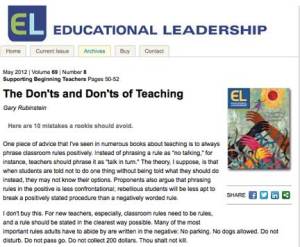Mentoring Monday: Gary Rubinstein offers don’ts for new teachers that mentors can include in their coaching
by Julie Dodd on Jul 30, 2012 • 5:14 am No Commentsby Julie Dodd
JEA Mentoring Committee co-chair
 New teachers certainly will make some mistakes in their beginning days and months of teaching.
New teachers certainly will make some mistakes in their beginning days and months of teaching.
Gary Rubinstein, a veteran math teacher who began in the second-ever Teach for America institute, offered 10 don’ts for beginning teachers in an article in Educational Leadership. I’m going to highlight four don’ts.
1. Don’t teach a lesson without a student activity.
For those of us who been teaching for a while, we know this. The lessons that are most effective for the students are those that get the students involved. Sometimes beginning teachers can feel compelled to be the one doing all the instruction.
As mentors, we can help new teachers see ways to incorporate both direct instruction and student activities – working with a partner or group on analyzing a news story for sources, working independently to write a lead, correcting sentences with AP style errors, etc.
Sometimes new teachers are hesitant to try to get students involved in activities because they are concerned about losing control of the class or not being able to get the class back as a group if they are working with a partner or in groups. So you can talk about strategies for those logistics, such as giving directions at the start of the activity.
In addition — For first-year teachers, a few days of trying to lecture for every class will help convince them that including student activities can help them from having voice strain.
2. Don’t send kids to the office.
Knowing that the school administration is there in case of an emergency is reassuring. But, in terms of discipline, the goal of teachers is to try and handle as many situations as possible themselves. New teachers who send students to the office soon realize that isn’t the best solution. The administration sends the student right back to the classroom, so the student smirks. The student doesn’t go to the office but meets a friend and skips school, so the problem is just worse.
As mentors, we can talk with new teachers about ways to avoid needing to send students to the office. What classroom rules are needed? How can classroom rules be enforced? Help the new teacher rehearse the conversation for dealing with problem students and situations.
3. Don’t try to be a buddy.
This can be particularly challenging for a new media teacher. Student media advisers can spend a great deal of time with students beyond the regular class schedule. Students work on publication assignments in the adviser’s room during lunch. To help staffs meet deadlines, the adviser works with students after school, in the evenings or on weekends. The adviser may take students to state or national conferences that can include overnight stays.
As mentors, we can talk with new advisers about how to develop a teaching style that lets the adviser be friendly and approachable but still establishes the adviser as the authority figure. Another aspect of establishing an appropriate relationship between the new teacher and the students is the teacher’s use of social media.
4. Don’t dress too casually.
Rubinstein says that new teachers “intentionally dress” not like a typical teacher to appear more genuine to the students. Rubinstein counsels: “If you look like a teacher, they will treat you like a teacher. Not appearing like a professional is way too big a risk.”
A teacher’s attire not only affects the perception that students have but the perception that other teachers, school administrators and parents have of the teacher. Those groups are particularly important to a new adviser who is trying to establish credibility. If you are going to chaperone a field trip, you need to look like someone whom parents can entrust their children’s safety. If you are trying to convince a school administrator that the media should be an open forum.
These last two areas can be particularly challenging for mentors to discuss with new teachers, as new teachers who typically are in their 20s or 30s may consider advice about dress or interactions with students to be outdated when coming from mentors.
What advice do you have for how to have productive conversations with new teachers about what can be difficult concepts?
What are some other don’ts that you would include as tips for new teachers?
[Thanks to JEA Mentoring Committee member Peggy Gregory for bringing Gary Rubinstein’s article to my attention. You can read more of his insights about teaching on his blog.]
